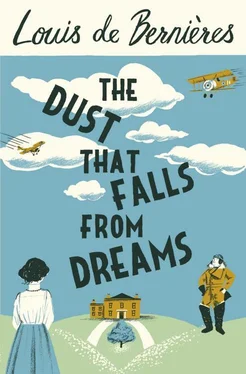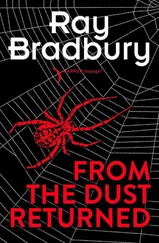‘And something else. The Huns always had a defensive approach to war in the air. They didn’t come over our lines in daylight, so we always had to take the fight to them. It was against the rules of war to use dumdums and incendiaries on other planes. We didn’t use them. If we’d crash-landed on their side, and been caught with them, we’d have been court-martialled and shot. But as the Huns did always crash on their own side of the lines, they didn’t have to worry about being court-martialled and shot, so they used incendiaries against us. There’s no other explanation for why our planes caught fire so easily and theirs didn’t. There was nothing that gave us the wind up more than the thought of being burned alive in a plane, and they knew it, because they were just as frightened of it themselves. So much for chivalry. Obviously one enjoys being thought of as a “knight of the air”, but I sometimes have to remind myself just how brutal it often was.’
‘So when you get a victory, does that mean a kill?’ asked Christabel. ‘I’ve often wondered.’
‘No, no, we counted victories, not kills. If you’ve got twenty or thirty victories, a lot of them will have been forced to land and so on. I killed hundreds of men by mowing them down in ground attacks, flying six feet above the ground and going straight at them, and I have no idea how many I killed with bombs. People don’t think about this, they only think about single combat, knight against knight. It comes from reading the papers. But yes, of course a little bit of chivalry occurred from time to time. We had a problem with jammed guns almost every time we went out. They said it was caused by deformed rounds that shouldn’t have passed inspection. We had to carry a hammer in the office — that’s the cockpit — and we’d spend half of every fight bashing the cocking levers with it. The frustration and rage was beyond imagining. I remember once my guns jammed in a dogfight and the pilot I was up against saw me struggling to clear them, so he flew alongside and waved and laughed at me whilst I hammered at the damned — I mean wretched levers … Anyway, I couldn’t clear them, and he just gave me a little wave and peeled off and flew away. That was a Fokker DV11, and I was in a Camel. He could have got me with no bother at all. I always wish I’d had the chance to fly a DV11. Once it happened again, and this time it was the Hun’s guns that jammed, so I repaid the favour, and let him go.’
‘Was it the same Hun?’ asked Christabel.
‘No, no. It wasn’t the same one. And then another time a courteous Hun waited for me to clear my guns and then he renewed the attack, so we had a good scrap, and I shot him down over Arras. I took him a bottle of cognac and some cigarettes in hospital, and we shook hands, but he got peritonitis, rather like poor Ashbridge, and died a few days later. I was very sorry about that. I always felt less awful when I could force someone down intact.
‘And once I lost my flight, somehow, and then I saw them not far away, slipping into some light cloud, so I caught up and came out the other side, and lo and behold, I was flying in formation right next to a little posse of Pfalz. The Hun beside me caught my eye at exactly the second that I caught his, and after a moment of complete mutual amazement, he laughed and signalled to me to fall back and creep away, and that’s exactly what I did. Mind you, even a whole posse of Pfalz would have had a struggle against a Camel. Much faster, but too slow on the turn.
‘So there was a little bit of chivalry from time to time, yes, there was; but what I remember the most is mowing down those columns of men and horses, seeing them topple, and fall, and being thankful that I couldn’t hear them because of the engine. Once there was a platoon up to its neck in water, but keeping going. You could use water to test the accuracy of your guns, because of the splashes. I strafed them and then came back for another go, and the brown water had turned red.’
There followed a long silence as they reflected on the horror of this, and then Daniel said, ‘Lots of strange and inexplicable things happened. Once, when I was shot down between the lines and managed to get to our trenches after dark, I discovered that the PBI believed that there was a magnificently wild and fearless scout pilot who did the most amazing feats of acrobatics and daredevilry right over the lines, almost every day. The troops used to look out for him and watch him, and he never got shot down. They were full of wonder and admiration. They called him “the Mad Major”. He really bucked up the troops an awful lot, and they used to cheer him on. Lots of the boys used to go and stunt for the infantry, just to keep their peckers up. There was a Naval Air Service fellow called Christopher Draper, used to fly under bridges and so on, and so did Gwilym Lewis. I did it too, particularly after I found out where Ash and Albert and Sidney were, but I happen to know, and so does everyone else who has checked up on these sightings, that a great deal of the time there wasn’t, technically speaking, anyone there at all. In other words, according to all the logs there was sometimes nobody there when the Mad Major was stunting above the lines. I have often wondered … well … do you suppose there can be ghosts who appear in the daytime? Was it … something like the Angels of Mons? Or can one be in two places at once, but unaware of it?
‘Shall we talk about something else?’
51. My Heart Is Sick with Memories
THE REVEREND CAPTAIN Fairhead arrived at exactly the appointed hour, having previously left his card in the old-fashioned, orthodox way. He was a small man, very neatly turned out, with a precise moustache. His hair was sparse and gingery, his lips were thin and straight, and his face had been aged before its time by the sights that he had witnessed.
He was wearing gloves, and an officer’s warm over his uniform, which Millicent took from him after she had let him in. She greatly admired its fur collar and double-breasted front, thinking that Hutch would have looked grand in such a garment.
Rosie would have preferred to have met him at the door herself, but somehow it had seemed more correct to sit in the drawing room on tenterhooks, pretending to be doing something. When Millicent ushered him in she rose from her chair to greet him, and he said, ‘Oh, please don’t get up.’ His voice was quiet. ‘You must be Miss McCosh.’ She nodded and smiled, and he said, ‘Reverend Captain Fairhead. I am very pleased to meet you.’
‘Please do sit down, Father,’ said Rosie, and to Millicent, ‘Would you bring in some tea and scones?’ To Fairhead she said, ‘It’s nice to have scones again. What a novelty it is to have enough sugar!’
Captain Fairhead sat in an armchair but perched himself on the front of it, as if to show that she had all his attention. ‘I used to dream of scones. At the front. Jam and cream, scones still warm from the oven. That and a decent jug of beer.’
‘I hope you had a good journey here,’ said Rosie.
‘I did indeed. You should see all the women at the polling stations. Whoever would have thought it would happen at last? I dare say we’ll all get used to it.’
‘One has to be over thirty,’ Rosie reminded him. ‘So we sweet young things aren’t to be credited with wisdom yet.’
‘Bound to end up equal, though, isn’t it?’ said Fairhead. ‘I mean, what’s the point of a halfway house?’
‘My mother has just voted for Sir Kingsley Wood,’ said Rosie. ‘She is immensely pleased with herself. She was in the WSPU, but then she handed in her membership when it became violent. Now she feels almost insufferably vindicated.’
‘Quite rightly,’ said Fairhead. ‘I am very much looking forward to meeting her.’
Читать дальше












